Salary Advice Letter
Dear [Recipient's Name],
Subject: Salary Advice and Request
I hope this letter finds you well. I am writing to discuss my current salary and explore the possibility of a salary adjustment based on my contributions and achievements during my tenure at [Company/Organization Name].
Over the past [time period], I have had the privilege of being a part of [Company/Organization Name], and it has been an incredibly rewarding experience. During my time here, I have consistently demonstrated a strong work ethic, commitment to excellence, and a willingness to take on additional responsibilities. I have contributed to the successful completion of several important projects and have received positive feedback from both colleagues and clients.
While I deeply value the opportunities and experiences I have gained at [Company/Organization Name], I would like to discuss the possibility of a salary increase that reflects my accomplishments and the added value I bring to the organization. After conducting thorough research on industry standards and considering my contributions, I believe that an adjustment to my current salary is warranted.
I understand that salary adjustments are subject to various factors, including company budget, performance evaluations, and market conditions. However, I would like to request a formal salary review to assess the potential for an increase that aligns with my performance and responsibilities.
I am open to having a constructive conversation about this matter and would appreciate the opportunity to discuss it further at a convenient time for you. I am confident that we can reach a mutually beneficial agreement that acknowledges my dedication and hard work while keeping the best interests of the company in mind.
Thank you for considering my request. I look forward to discussing this matter with you and am available at your earliest convenience.
Sincerely,
[Your Name]
Formal Salary Advice Letter
Subject: Salary Adjustment Notification
Dear [Employee Name],
We are pleased to inform you that your salary has been reviewed and an adjustment has been made effective [Date]. Your new monthly salary is [Amount], reflecting your performance and contribution to the organization.
Please contact the HR department if you have any questions or require clarification regarding this change.
Sincerely,
[Your Name]
[Position]
[Company Name]
Salary Increment Advice Email
Subject: Notification of Salary Increment
Hi [Employee Name],
We are delighted to inform you that due to your outstanding performance, your salary will be increased to [New Salary] effective from [Date]. This adjustment is part of our annual performance review cycle.
Congratulations and keep up the excellent work.
Best regards,
[Your Name]
HR Department
[Company Name]
Provisional Salary Advice Letter
Subject: Provisional Salary Details
Dear [Employee Name],
This letter is to provide provisional information regarding your upcoming salary adjustment effective [Date]. Your provisional salary will be [Amount], pending final confirmation from management.
You will receive the finalized salary advice once all approvals are completed.
Regards,
[Your Name]
HR Department
[Company Name]
Salary Advice Letter with Deduction Explanation
Subject: Salary Details for [Month/Year]
Dear [Employee Name],
Please find below the details of your salary for [Month/Year]. Your gross salary is [Amount], with the following deductions applied: [List Deductions]. Your net salary is [Amount].
If you have any questions regarding the deductions, please contact the payroll department.
Sincerely,
[Your Name]
HR/Payroll Department
[Company Name]
Casual Salary Advice Message
Subject: Your Salary Update
Hey [Employee Name],
Just a quick note to let you know your salary has been updated to [Amount] starting from [Date]. Great job on your contributions!
Cheers,
[Your Name]
HR Team
Salary Advice Letter for Promotion
Subject: Salary Adjustment Due to Promotion
Dear [Employee Name],
Congratulations on your promotion to [New Position]. In recognition of your new role and responsibilities, your salary has been adjusted to [New Salary] effective [Date].
We appreciate your dedication and look forward to your continued success in your new role.
Warm regards,
[Your Name]
HR Department
[Company Name]
What a Salary Advice Letter Is and Why It Is Important
A Salary Advice Letter is an official document informing an employee of their salary details, including basic pay, allowances, deductions, or increments.
Purpose:
- To provide transparency regarding salary computation.
- To notify employees of salary changes due to performance, promotion, or policy updates.
- To serve as a reference for payroll records and employee documentation.
Who Should Send a Salary Advice Letter
- Human Resources or Payroll Departments.
- Managers or supervisors in consultation with HR for specific adjustments.
- Company executives when addressing high-level salary changes.
Whom Should Receive a Salary Advice Letter
- Employees of the organization.
- Newly promoted staff.
- Individuals receiving provisional or adjusted salaries.
- Employees affected by salary deductions or bonuses.
When to Send a Salary Advice Letter
- After performance reviews or salary increments.
- Upon promotion or change in role/responsibilities.
- When salary adjustments due to deductions or bonuses occur.
- At the start of a fiscal year for annual salary updates.
How to Write and Deliver a Salary Advice Letter
- Collect accurate salary and deduction information.
- Include effective date, gross and net salary, and breakdown of allowances/deductions.
- Maintain professional and clear language.
- Deliver via email for speed or printed letter for official record.
- Ensure recipient acknowledgment when necessary.
Requirements and Prerequisites for Issuing Salary Advice
- Updated payroll information.
- Approval from management for salary adjustments.
- Accurate calculation of deductions, bonuses, or allowances.
- Confirmation of effective dates and compliance with labor laws.
Formatting Guidelines for Salary Advice Letters
- Tone: Professional, clear, and respectful.
- Length: Concise, ideally one page.
- Include employee name, designation, department, salary breakdown, and contact for queries.
- Optional: Signature of HR or authorized personnel for printed letters.
- Delivery: Email or printed copy depending on company policy.
After Sending the Salary Advice Letter
- Ensure receipt acknowledgment by the employee.
- Address any queries or discrepancies promptly.
- Update payroll records to reflect the advised salary.
- Keep a copy in employee personnel files for reference.
Common Mistakes to Avoid in Salary Advice Letters
- Incorrect calculation of salary or deductions.
- Missing essential details like effective date or net salary.
- Using unclear or ambiguous wording.
- Forgetting to include contact information for queries.
- Sending letters without necessary managerial approval.
Essential Elements and Structure of a Salary Advice Letter
- Subject line clearly stating purpose.
- Greeting and employee identification details.
- Salary details: gross, net, allowances, deductions.
- Reason for any adjustment or increment.
- Effective date of salary change.
- Contact information for payroll queries.
- Professional closing and signature of HR or authorized person.
Tricks and Tips for Effective Salary Advice Letters
- Use a clear and structured format for easy understanding.
- Provide a breakdown of all components to avoid confusion.
- Double-check calculations before sending.
- Keep tone professional but appreciative for performance-based adjustments.
- Maintain confidentiality in digital and printed communications.
Compare and Contrast Salary Advice Letters with Payslips
- Salary Advice Letter: Formal communication regarding adjustments, increments, or promotions, often explanatory.
- Payslip: Detailed record of salary paid for a specific period, including deductions and net amount.
- Both serve as references, but letters often accompany changes, while payslips document ongoing payroll.
FAQ About Salary Advice Letters
Q: Can a salary advice letter be sent by email?
A: Yes, email is acceptable if confidentiality is ensured and company policy allows digital records.
Q: Should all deductions be explained?
A: Yes, transparency about deductions helps prevent misunderstandings.
Q: Is it mandatory to issue a salary advice letter for every increment?
A: While not always legally required, it is best practice for transparency and record-keeping.
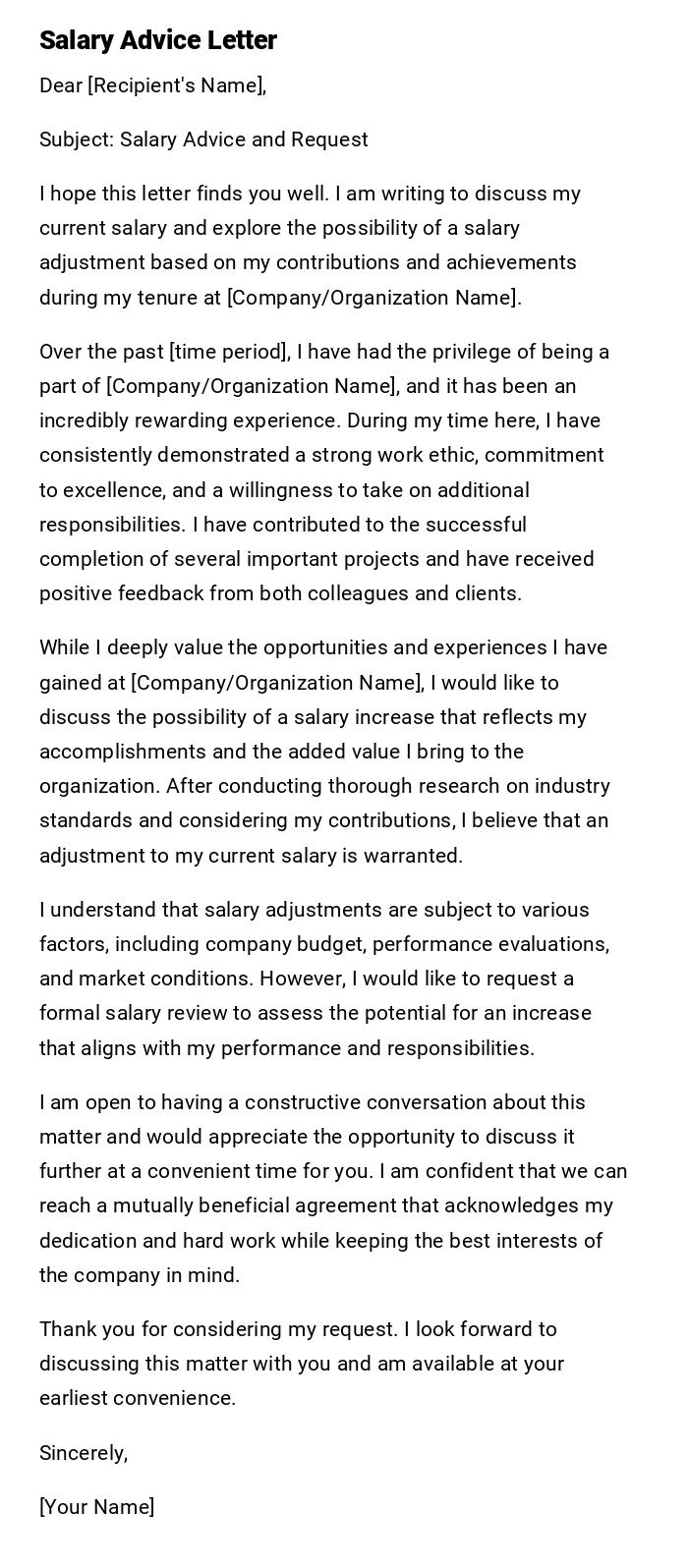
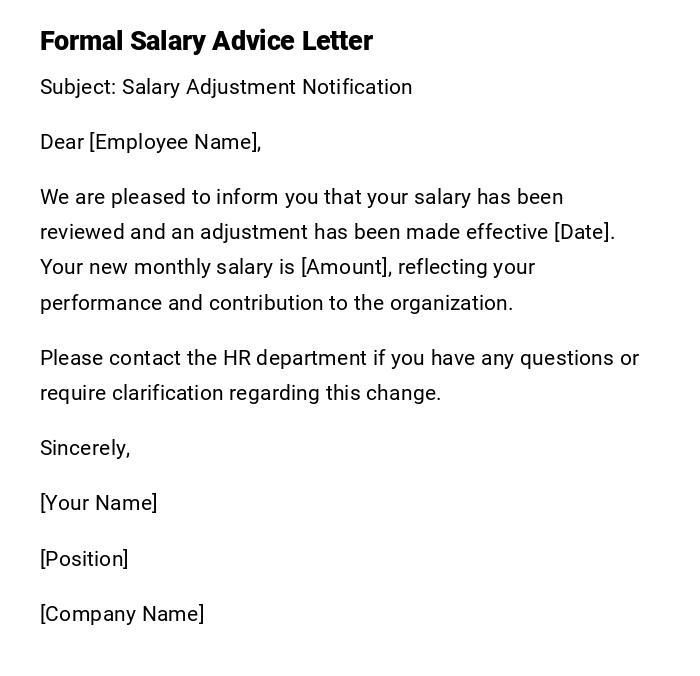
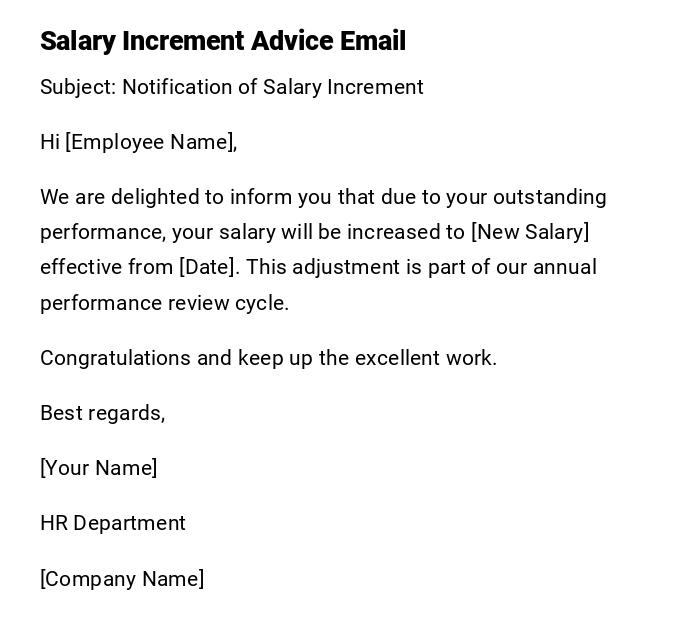
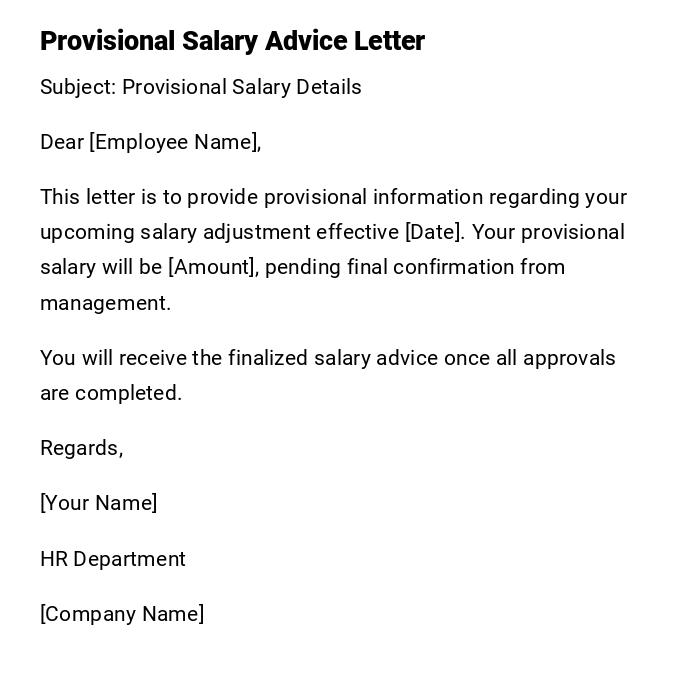
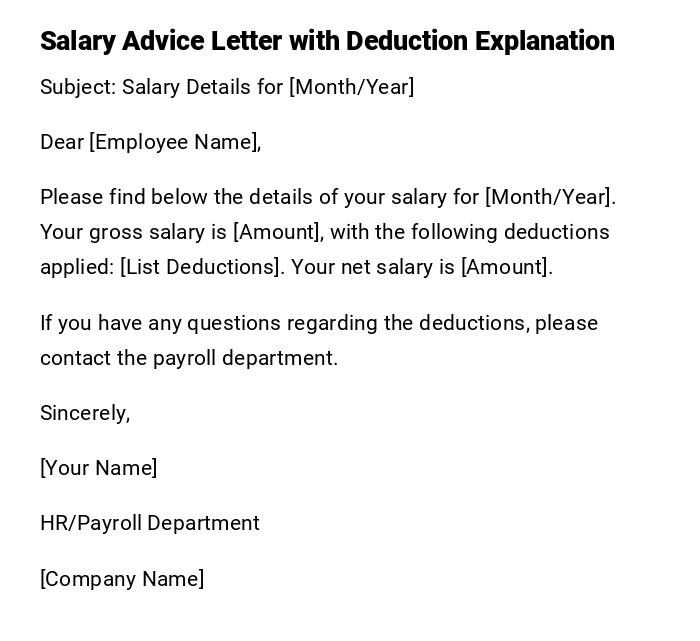
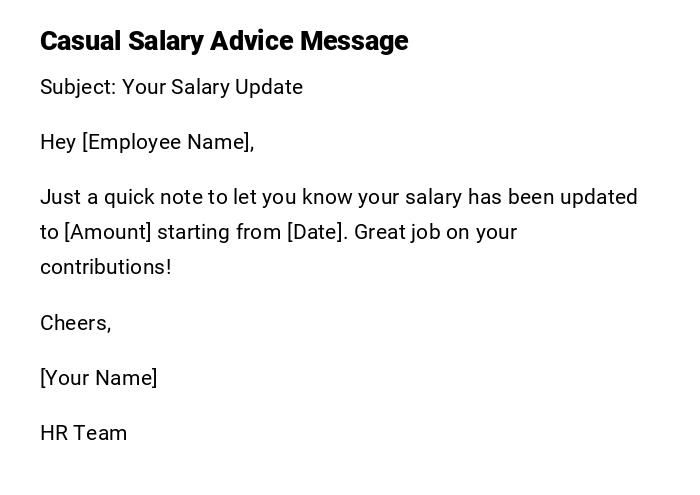
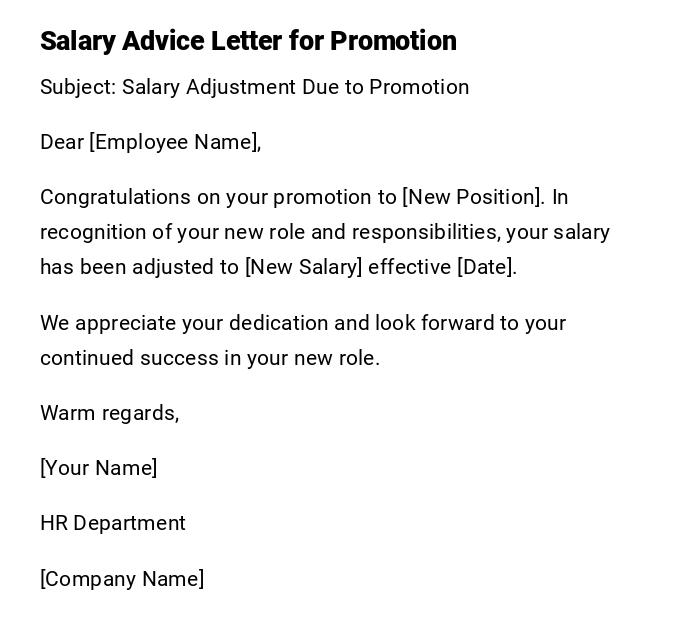

 Download Word Doc
Download Word Doc
 Download PDF
Download PDF